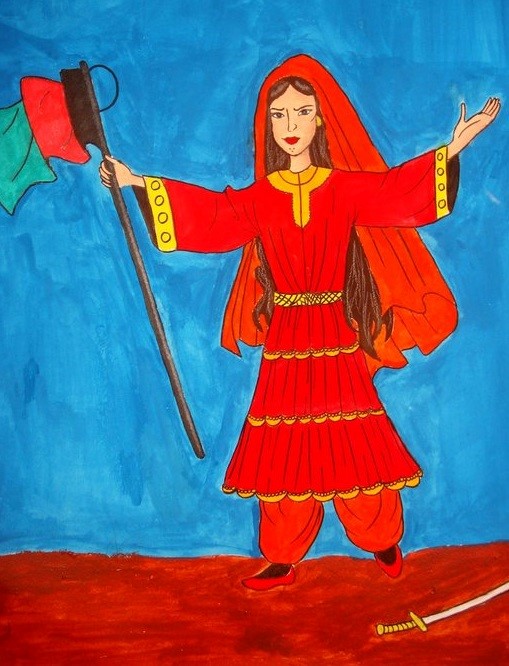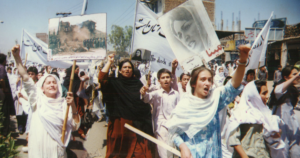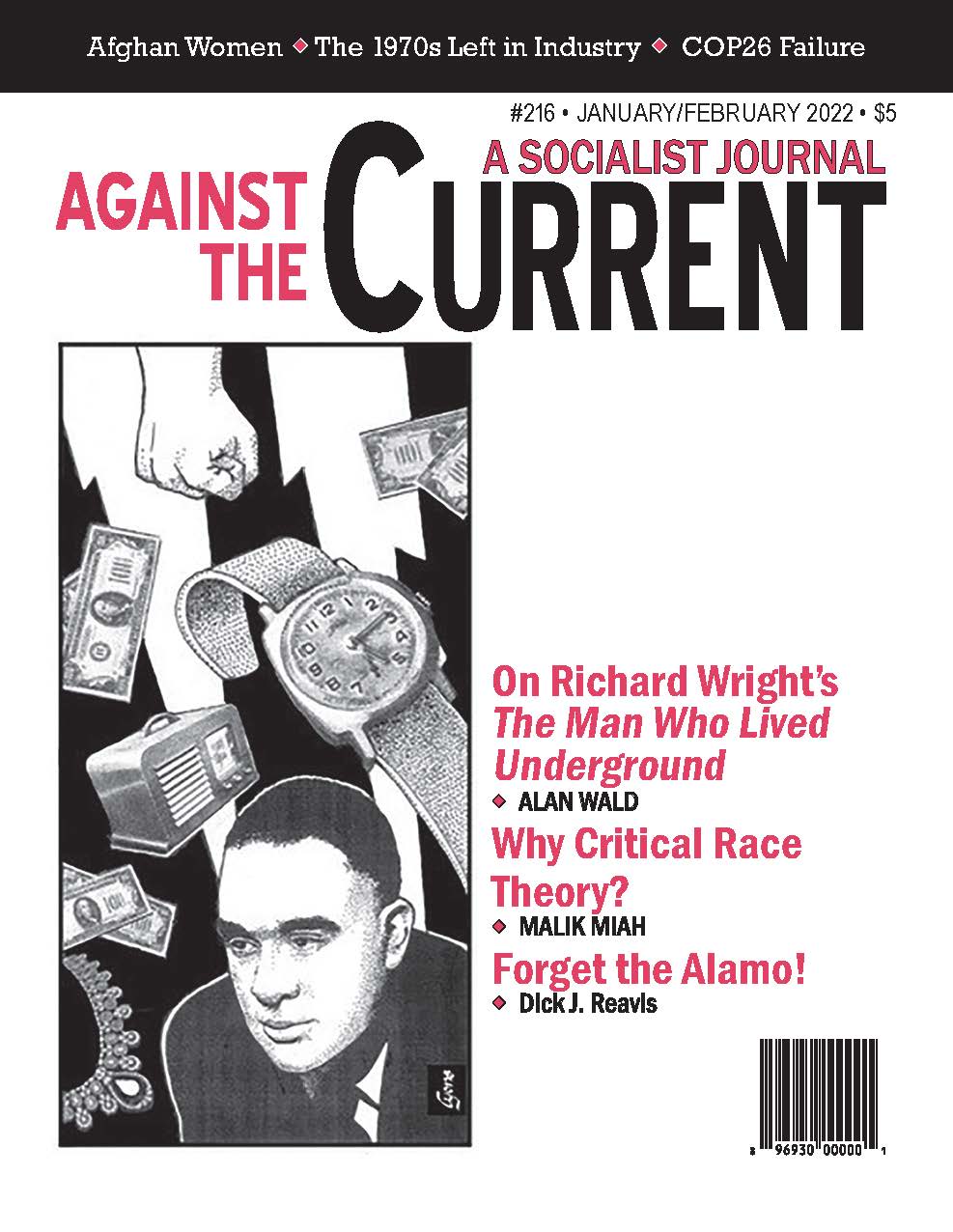Against the Current, No. 216, January-February 2022
-
COP26: Success Not an Option
— Daniel Tanuro -
Afghan Women: Always Resisting Empire
— Helena Zeweri and Wazhmah Osman -
Entangled Rivalry: the United States and China
— Peter Solenberger -
On Global Solidarity
— Karl Marx - #MeToo in China
-
How Electric Utilities Thwart Climate Action: Politics & Power
— Isha Bhasin, M. V. Ramana & Sara Nelson -
Ending Michigan's Inhumane Policy
— Efrén Paredes, Jr. -
Oupa Lehulere, Renowned South African Marxist
— James Kilgore -
Reproductive Justice Under the Gun
— Dianne Feeley - Save Julian Assange!
- The Horror of Oxford
- Racial Justice
-
Why Critical Race Theory Is Important
— Malik Miah -
Texas in Myth and History
— Dick J. Reavis -
A City's History and Racial Capitalism
— David Helps -
Reduction to Oppression
— David McCarthy -
Protesting the Protest Novel: Richard Wright's The Man Who Lived Underground
— Alan Wald - Revolutionary Tradition
-
The '60s Left Turns to Industry
— The Editors -
My Life as a Union Activist
— Rob Bartlett -
Working 33 Years in an Auto Plant
— Wendy Thompson - Reviews
-
Michael Ratner, Legal Warrior
— Matthew Clark -
The Turkish State Today
— Daniel Johnson
Helena Zeweri and Wazhmah Osman

IN RECENT MONTHS we have seen the resuscitation of the “saving Afghan women” narrative in media commentaries following the U.S. military withdrawal. As much scholarship has shown ever since the 2001 military intervention, this narrative functions to do two things.
First, it ignores the fact that Afghan women have not only been critiquing the inhumane Taliban regime, but the human consequences of U.S. empire. Second, it fails to consider how Afghan women’s resistance over the past 100 years has been deeply committed to an anti-imperial politics.
From resisting the British to the Soviet Union, to more recently the United States, since the mid-19th century women in Afghanistan have been struggling against imperial rule and occupation. From female revolutionaries of the mid-19th century who fought the British, to the women of the Revolutionary Association of the Women of Afghanistan (RAWA) who continue to resist imperialism, Afghan women have been front and center.
While the valorization of anti-imperial male heroes like Ahmad Shah Massoud, known as “the Lion of Panjshir Valley,” and tropes like “the graveyard of empires” paint Afghanistan as a site marked by a rugged warrior-like masculinity, women get dismissed in narratives that center local forms of resistance.
As we have written elsewhere, two of the most prominent Afghan women anti-Soviet occupation activists were Nahid-i-Shahid, often known as Nahid the martyr, and Meena Kamal, the founder of the Revolutionary Association of the Women of Afghanistan. Yet unlike their male counterparts, they have received little attention in the mainstream western press.
Even when Afghan women’s voices have been the subject of media commentaries and policy forums, such as over the last few months, their voices are routinely used as evidence to fuel the narrative that the U.S. and international presence in Afghanistan were critical to ensuring their freedom and human rights.
By recognizing the anti-imperial orientation of Afghan women’s politics, we can better understand how Afghan women have actually been part of a bigger and more global conversation on empire, occupation, and by extension decoloniality. This framework is in direct contrast to portrayals of Afghan women’s struggles as insular and only concerned with the Taliban or Islamic fundamentalism.
Malalai’s Legacy
One of the most well-known female activist figures that can be called anti-imperial is Malalai of Maiwand, a folkloric ethno-national hero among Afghans. Malalai played a pivotal role in the second Anglo-Afghan War in 1880 in the Battle of Maiwand, in Kandahar Province.
Although there are various accounts of her exact role in the battle, the general consensus in oral stories and Afghan history books is that she rallied a demoralized Afghan army on the verge of retreat and near surrender. She raised the Afghan flag and proclaimed that dying under the fire of the British artillery was an honor.
Through treating and assisting wounded soldiers, she helped boost the morale of Ayub Khan’s forces. In some versions, her role in the battle is more active as she participates in directly fighting the British army. While she herself was killed in battle by the British army, the Afghan army emerged victorious.
Malalai’s name has been enshrined within many institutions like schools and hospitals in Afghanistan as well as in folklore and poetry. Her grave has become a shrine where people visit from near and far to pray.
Like the female poets before her who routinely deviated from social and cultural norms around femininity and gender (people like Rabia Balkhi and Zebun Nissa), Malalai of Maiwand has inspired generations of girls in the region including the iconic Malala Yousafzai. In fact, in her autobiography I am Malala, Yousafzai states that she is named after this historical heroine, and cites her struggle against the British as inspirational.
Not surprisingly, however, Malalai of Maiwand does not appear anywhere in the fastidious archives of the British. Her story nonetheless reminds us that the erasure of strong, politically active Afghan women who attempted to resist the status quo is not unique to U.S. imperial discourses, but goes back to the post-imperial historical narrative-making of the British (Osman 2019).
Alongside the self-determination movements that spread throughout the former British and French colonies in the Middle East and North Africa in the 1960s and 1970s, Afghanistan underwent its own consciousness-raising movements. Women in Afghanistan have long been speaking out against imperial occupation, using globally circulating ideas around anti-imperialism and decoloniality for inspiration.
Ideas of coloniality and decoloniality have a long history in Afghanistan. The pejorative Persian word gharbzadegi, a term first coined by Iranian intellectuals that literally translates to being hit or struck by the West but is commonly translated as “Westoxification” (referring to the harms imposed by Western colonial impositions and values), had already been spreading from West to East Asia.
RAWA’s Struggle

In 1977, the Revolutionary Association of the Women of Afghanistan was formed with the aim of promoting women’s human rights and democratic governance. While created by urban educated women, RAWA aimed to include women from across socioeconomic strata into the struggle for women’s rights.
Over the decades the group has spoken out against the Soviet-backed government in the 1970s, the conservatism of the anti-Soviet resistance (mujahedin) in the 1980s, the Taliban regime in the 1990s, the role of the Pakistani state in creating the Taliban and the U.S. occupation of the 2000s.
They have continued to speak out against both Islamic fundamentalism and U.S. imperialism, drawing upon global anti-imperial efforts and declaring their solidarity with other decolonial movements. For example, in late August 2021, RAWA put out a statement drawing connections between their resistance to the Islamic State in Afghanistan (which they frame as a kind of imperial power) and Kurdish women’s resistance in the YPJ (Women’s Protection Unit) to the Islamic State and Turkish occupying forces.
They discuss YPJ’s emphasis on democratic confederalism as a form of direct democracy that moves beyond the nation-state paradigm, and is decentralised and bottom-up:
“Just as in Afrin, where the YPJ, which inspires women from all over the world, was founded, and where today women are subjugated and murdered as a result of the policies of the global hegemonic powers, also the women in Afghanistan face the same threat now. Their struggle against ISIS and other medieval-aged criminals have given us huge lessons. We know that no force on earth, not ISIS and its superpower backer and other countries in the region, can stand in the face of true resistance from the masses. We understand the sacrifices we have to make in order to attain our dream society.”
RAWA gained notoriety in the American political imagination in the early 2000s when the Feminist Majority Foundation mobilized their images of women being persecuted in public to solidify the case for war and militarized humanitarian intervention. (Cooke, 2002)
As Wazhmah Osman has written, “Due to their lack of cultural access, even transnational feminist organizations that genuinely sought to help, directed their attention to and gathered their information from the same few websites of Afghan women’s organizations that were available in English.” (Osman, 2014, 877) It is also important to note that RAWA itself has also mobilized the language of women’s cultural oppression in ways that have made it vulnerable to instrumentatization and co-optation by pro-war feminist agendas, including that of FMF.
Over time, however, RAWA has become more critical of the instrumentalization of women’s stories as a justification for military escalations.
In September 2019 in an interview with Samia Walid, Afghan women’s freedom is also tied to the struggle against U.S. imperialism and its Afghan “internal lackeys.” Walid’s take is a particularly illustrative example of how RAWA views the extent to which imperial ideas have been internalized among putatively progressive Afghan women activists:
“The US is a master at diverting revolutionary and political struggle of people, especially women. In the past eighteen years, in addition to supporting the most anti-women elements all over Afghanistan and ensuring that these elements remain untouchable, the US has introduced a stream of educated women into the government and other institutions, NGOs, civil society, and women’s networks. This has a dual purpose. First, it uses these women to deceive the world about the real situation of Afghan women and presents them as its achievement in its tiring war. Second, by taking such educated women under its wing, it makes sure that they don’t join the revolutionary struggle, thus depriving the women’s movement of valuable people.”
Solidarity, Not Benevolent Saviors!
The organization has also been inspired by a broader global effort to critique the imperial idea of “saving Muslim women,” which has come to characterize so many liberal NGO and feminist organizations’ approaches to women’s empowerment in Afghanistan.
In its critique of the Feminist Majority Foundation, RAWA cites Columbia professor Lila Abu-Lughod’s writing on the colonial history of the “saving Muslim women” narrative as a way to speak truth to the colonial power dynamics and principles undergirding contemporary feminist projects:
“Columbia Professor Lila Abu-Lughod, a woman of Palestinian descent, writes: ‘We need to be suspicious when neat cultural icons are plastered over messier historical and political narratives; so we need to be wary when Lord Cromer in British-ruled Egypt, French ladies in Algeria, and Laura Bush, all with military troops behind them, claim to be saving or liberating Muslim women.’” (Abu-Lughod 2002, 2013)
Here, RAWA’s citation of Abu-Lughod is also a commentary on the dangers of benevolent governance as a pretext for intervention. The notion of “benevolent governance” as a system of power relations refers to the idea that certain forms of authoritative rule are an expression of generosity on the part of those who rule, usually under the pretext that a given population lacks the infrastructure, reasoning, and public will to rule themselves.
This is a discourse through which imperial projects justify themselves as anchored in an ethics of care as opposed to what they really are: a politics of exploitation, extraction, and geopolitical grandstanding.
Finally, RAWA’s commitment to a global solidarity politics is expressed through their engagement with other revolutionary women-led groups, such as their meeting with South Asian feminist activists in 2015, including Heela Faryal’s visit to meet with Kamla Bhasin, the coordinator of the One Billion Rising in South Asia, Ananthi Sasitharan, an activist with the Liberation Tigers of Tamil Eelam in Sri Lanka, and Elahe Amani, an Iranian activist working in Afghanistan.
Afghan women’s anti-imperial activism has continued into recent years. As the War on Terror continued into the mid-2000s, activists like Malalai Joya (who is also named after Malalai of Maiwand) spoke out against the deaths of tens of thousands of civilians as a result of U.S.-led drone warfare. Joya who was elected as the MP of Farah Province in 2003 and re-elected multiple times thereafter, has repeatedly denounced the United States’ political maneuvers of bribing and empowering regional warlords and breeding other forms of corruption in the central government.
Joya has been one of the most outspoken public voices on how the Taliban fundamentalism and U.S. imperialism benefit from each other. Many of her public interviews denounced the U.S.-backed Karzai regime’s bringing former warlords into the government where they committed war crimes, abused civilians and continued their ties with narcotics, smuggling and criminal networks. As Joya noted in 2021: “Unfortunately, they pushed us from the frying pan into the fire as they replaced the barbaric regime of the Taliban with the misogynist warlords.”
The U.S.-backed peace deal between the Ghani government and Hezb-e Islami warlord Gulbuddin Hekmatyar, also known as “the Butcher of Kabul” for his brutalities during the 1990s warlords’ conflict, was another example of this.
For Joya, the 2016 agreement with Hekmatyar set the stage for the 2020 U.S.-led peace negotiations between the Kabul government and the Taliban in Doha.
Groups advocating for Afghan women to have a seat at the table were frustrated with the Trump administration for empowering the Taliban while delivering a setback to the causes of Afghan women over this past year.
Joya’s anti-imperial stance is inspired by other global efforts that resist settler colonialism and empire. In a recent video Malalai Joya talked about “being a Palestinian in her own country,” referring to the displacement Palestinians routinely experience as a result of ongoing dispossession of their lands and cultures.
As Prachi Patankar, co-founder of the South Asia Solidarity Initiative, has quoted Joya saying in an analysis of her activism, “‘The movements and uprisings in Arab countries show that the majority of people view fundamentalists as a plague. The fight against fundamentalism is a war for freedom and justice irrespective of being a Muslim, Hindu, Jew, or Christian…Afghan people are squashed between three enemies: Taliban, fundamentalist warlords and NATO troops. If the foreign enemy leaves Afghanistan, my people would face two internal enemies, and it would be easier to fight against them’ (Joya, interview by the author, email, May 2011)” (Patankar 2011, 285-86).
Joya has also built a strong coalition of progressive people consisting of women, students and the poor who have joined with her to struggle for a better future, inspired by the Arab Spring and other revolutionary movements (ibid., 286).
Through pointing to these examples, we show a rich Afghan women-led resistance, from direct combat against empire to calling out the government for failing to engage in direct democracy. We also show how Afghan women have critiqued benevolent governance as a premise for militarized humanitarianism, and the collusion of fundamentalist Islamists with U.S. imperial forces.
These examples demonstrate how that occupation has always been a central focus of Afghan women’s resistance, rather than the concern of a few elitist groups. For women in Afghanistan the struggle for self-determination has always been a struggle against empire.
References:
Abu-Lughod, Lila. 2002. “Do Muslim Women Really Need Saving: Anthropological Reflections on Cultural Relativism and Its Others.” American Anthropologist 104(3): 783-790.
Abu-Lughod, Lila. 2013. Do Muslim Women Need Saving? Cambridge: Harvard University Press.
Cooke, Miriam. 2002. “Saving Brown Women.” Signs: Journal of Women in Culture and Society 28 (1): 485-487.
Osman, Wazhmah. 2014. “On Media, Social Movements, and Uprisings: Lessons from Afghanistan, Its Neighbors, and Beyond.” Signs: Journal of Women in Culture and Society 39 (4): 874-887.
Osman, Wazhmah. 2019. Media and imperialism in the global village: A case study of four Malalais. In A. Punathambekar & S. Mohan (Eds.), Global digital cultures: Perspectives from South Asia (280-300). Ann Arbor, MI: University of Michigan Press.
Patankar, Prachi. 2011. “Toward a More Effective Solidarity.” Women’s Studies Quarterly 39(3/4): 282-287.
January-February 2022, ATC 216


Very good and informative. I miss mention of the womens struggles in the period just before Soviet Intervantion, which really was a failure and a trap as Zbigneski said.